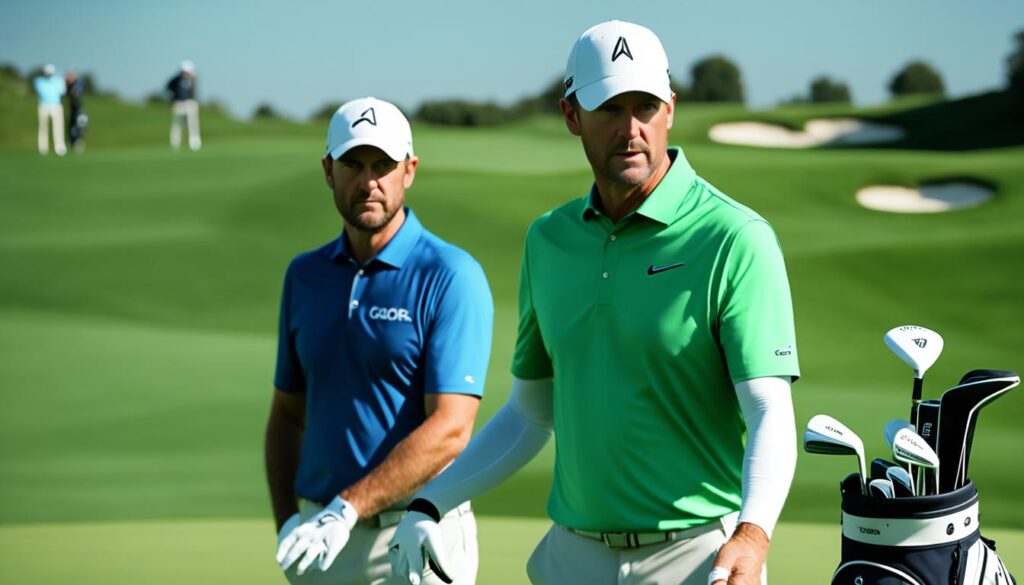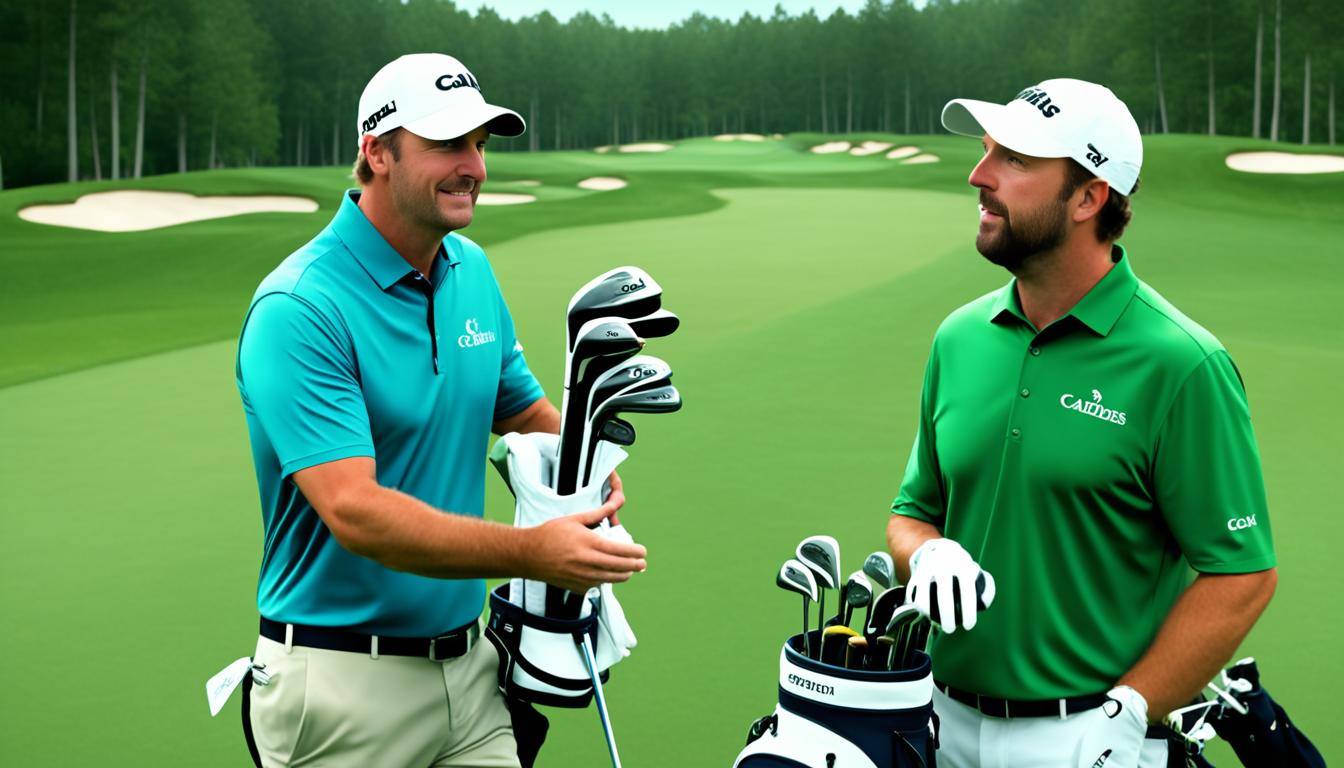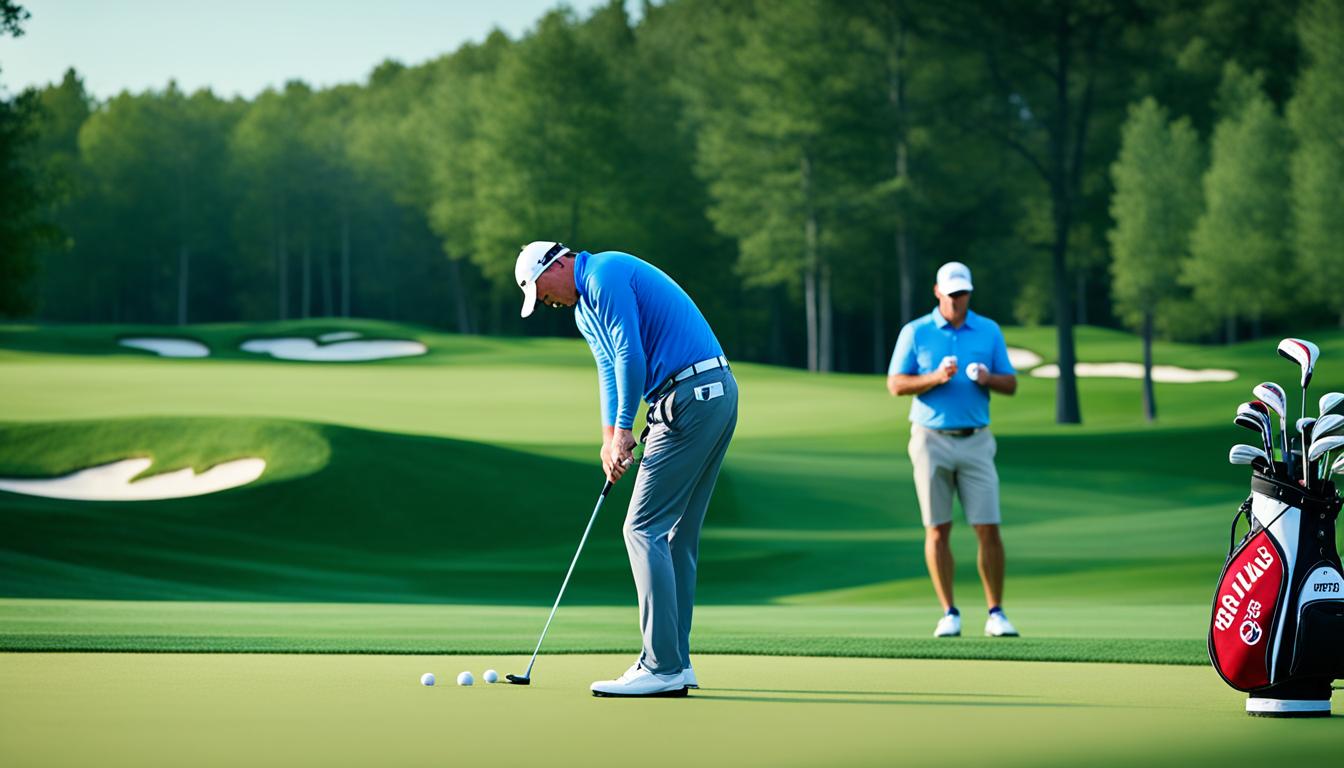Golf caddies play a vital role on different golf courses, providing a range of services and support to enhance the golfing experience. From club selection to emotional support, their responsibilities extend beyond carrying golf bags. Caddies have evolved from being companions and entertainers to becoming experts in the game, offering strategic insights and advice to golfers. Let’s explore the various aspects of their role and the dynamics that shape the caddie-player relationship.
Key Takeaways:
- Golf caddies contribute to the player’s success by providing valuable knowledge of the course, reading player body language, and offering guidance on shot selection.
- Caddies have a rich history that dates back to ancient times, evolving from companions and entertainers to becoming integral to a player’s success in professional golf tournaments.
- The duties of a golf caddy include club selection, course navigation, emotional support, equipment maintenance, and pace management.
- An effective golf caddy possesses physical fitness, game and course knowledge, interpersonal skills, professionalism, and decision-making abilities.
- Caddies enhance the golfing experience through their services, strategic insights, and the development of a trusted caddie-player relationship.
The Historical Evolution of Golf Caddies
Golf caddies have been an integral part of the sport since ancient times. In the early days, caddies provided more than just assistance with carrying golf clubs and equipment. They offered companionship, entertained golfers, and offered moral support throughout their rounds. Caddies were not only tasked with making the game easier for the players, but they also provided a source of enjoyment and camaraderie on the course.
As golf evolved and became more formalized, caddies took on a more defined role. They became knowledgeable about the game, familiar with different courses, and began to offer strategic advice to golfers. Caddies started to analyze course conditions, provide insights on club selection, and offer guidance on shot selection to enhance a player’s performance.
The advent of professional golf tournaments further solidified the significance of caddies in the sport. Caddies became essential for players competing at the highest level, as they possessed a deep understanding of the courses and provided detailed knowledge that contributed to a player’s success.
This historical evolution of golf caddies reflects the importance they have held throughout the centuries. From ancient times to the present day, caddies have transitioned from being mere companions and equipment carriers to becoming invaluable sources of strategic advice and support for golfers.
| Period | Role of Caddies |
|---|---|
| Ancient Times | Provided companionship, carried equipment, and offered moral support to golfers. They were entertainers and confidants, adding an element of fun to the game. |
| Early Golf | Started to offer strategic advice, analyze course conditions, and provide insights on club selection. |
| Professional Golf Tournaments | Became integral to a player’s success by providing detailed knowledge of the course, analyzing conditions, and helping with club selection. |
The Duties of a Golf Caddy
Golf caddies play a pivotal role on the golf course, taking on a variety of important duties to enhance a golfer’s experience. From club selection to course navigation, emotional support, and equipment maintenance, caddies are essential in ensuring a smooth and enjoyable round of golf.
One of the key responsibilities of a golf caddy is assisting golfers with club selection. Based on their knowledge of the player’s skills and the course conditions, caddies provide valuable insights and recommendations on which clubs to use for each shot. This guidance allows golfers to make informed decisions and optimize their performance on the course.
Caddies also take on the task of navigating the course, guiding golfers along the best route to follow. They have an in-depth understanding of the course layout, including potential hazards and strategic shortcuts. By helping golfers avoid obstacles and stay on the optimal path, caddies contribute to a smoother and more efficient round of golf.
In addition to physical support, caddies offer emotional support to golfers throughout their game. They serve as a calming presence, providing reassurance and motivation during challenging moments. Their presence and encouragement help golfers stay focused, maintain a positive mindset, and perform at their best.
Equipment maintenance is another vital duty of golf caddies. They ensure that golfers’ clubs are clean, organized, and readily available for use. Caddies inspect and maintain the equipment, making sure it is in good condition and functioning properly. This attention to detail saves golfers time and ensures that they have the right tools for every shot.
Caddies also contribute to managing the pace of play on the golf course. They coordinate with other caddies and players to maintain an optimal speed that keeps the game flowing smoothly. This pace management ensures that golfers have a seamless and enjoyable experience without unnecessary delays.
Furthermore, caddies play an important role in fostering positive caddie-player dynamics. They build a relationship of trust, camaraderie, and professionalism with the golfer. Through effective communication and understanding, caddies tailor their support to the golfer’s preferences and needs, creating a harmonious and productive partnership.
“As a caddy, our duties extend beyond carrying clubs. We are strategic advisors, navigators, emotional pillars, equipment caretakers, and pace managers. Our role is to enhance the golfer’s experience and contribute to their success.”
Overall, golf caddies are integral to the golfing experience, providing valuable guidance and support to golfers on and off the course. Their duties encompass club selection, course navigation, emotional support, equipment maintenance, pace management, and maintaining positive caddie-player dynamics.

The Skills and Qualities of an Effective Golf Caddy
Being a golf caddy requires a combination of physical fitness, knowledge, and interpersonal skills. Caddies must be physically fit to endure the demands of the golf course and carry heavy golf bags. This allows them to keep up with the pace of play and provide seamless assistance throughout the game.
In addition to physical fitness, caddies need extensive knowledge of the game and course. They must have a deep understanding of the rules, strategies, and techniques involved in golf. This knowledge allows them to provide valuable insights and advice to golfers, aiding in club selection, shot placement, and general course navigation.
Interpersonal skills are crucial for caddies, as they interact closely with golfers throughout the game. Caddies must quickly establish a rapport with golfers, showing professionalism, friendliness, and adaptability to different personalities. Effective communication and active listening play a significant role in understanding golfers’ preferences and delivering personalized service.
“A good caddy not only carries your clubs but also helps you maintain focus and stay in the right mindset.”
Trust and familiarity are key factors in building a productive caddie-player relationship. Golfers rely on their caddies for accurate and timely information, and this reliance stems from a foundation of trust. Caddies who are familiar with a golfer’s playing style, strengths, and weaknesses can offer tailored guidance, enhancing their performance on the course.
The ability to make effective decisions is another crucial skill for golf caddies. They must analyze various factors, such as weather conditions, course layout, and golfer expertise, to provide accurate and relevant information. By making informed suggestions and guiding golfers in decision-making, caddies contribute to the overall strategy and success of the game.
Overall, an effective golf caddy encompasses a wide array of skills and qualities. Their physical fitness, knowledge of the game and course, interpersonal skills, professionalism, trustworthiness, familiarity, and decision-making abilities are all essential in providing exceptional service and ensuring an enjoyable golfing experience for the player.
Conclusion
Golf caddies play an integral role on different golf courses, enhancing the golfing experience and providing strategic insights to golfers. Their expertise and knowledge contribute to a player’s success, making them valuable assets on the course. With their guidance on club selection, course navigation, and equipment management, golfers can optimize their performance and improve their overall golfing experience.
The caddie-player relationship is built on trust, camaraderie, and professionalism. Golfers rely on their caddies for support, both emotionally and strategically, creating a strong bond between them. Caddies not only provide essential course knowledge, but they also offer a comforting presence during challenging moments, helping golfers stay focused and motivated.
Furthermore, golf caddies possess a unique set of skills and qualities that make them effective in their role. Their physical fitness allows them to endure the demands of the golf course while carrying heavy golf bags. Their deep knowledge of the game and the specific course they are working on enables them to provide accurate and relevant strategic insights. Interpersonal skills, professionalism, and decision-making abilities are essential for building a successful caddie-player relationship and ensuring a smooth and enjoyable golfing experience.
FAQ
What are the responsibilities of a golf caddy?
Golf caddies have various responsibilities, including assisting with club selection, navigating the course, providing emotional support, maintaining equipment, and helping golfers achieve their best performance.
How have golf caddies evolved over time?
Golf caddies have evolved from being companions and entertainers to becoming experts in the game, offering strategic insights and advice to golfers. They have become integral to a player’s success by providing detailed knowledge of the course and analyzing conditions.
What duties does a golf caddy have on the course?
Golf caddies assist golfers with club selection, navigate the course, provide emotional support, maintain and organize equipment, manage the pace of play, coordinate with other caddies and players, and maintain a positive caddie-player relationship.
What skills and qualities are important for a golf caddy?
Being a golf caddy requires physical fitness, knowledge of the game and course, interpersonal skills, professionalism, trust, familiarity, and decision-making abilities.
How do golf caddies contribute to the golfing experience?
Golf caddies provide strategic insights, knowledge of the course, and emotional support to golfers, enhancing their overall golfing experience.



